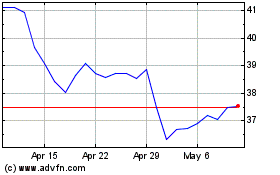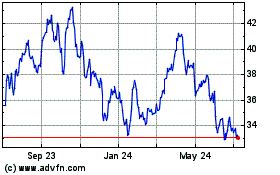Venezuela Oil Production Drops Sharply in May
June 13 2016 - 10:09PM
Dow Jones News
By Kejal Vyas and Timothy Puko
Venezuela registered its biggest monthly oil-production decline
in a decade in May, according to data released Monday by the
Organization of the Petroleum Exporting Countries, signaling
further trouble for a country already enduring severe economic
hardship.
The decline of 120,000 barrels a day, to 2.37 million barrels a
day, underscores the inability of state energy company Petróleos de
Venezuela SA to maintain oil-industry investments, as the region's
largest petroleum exporter suffers from a debilitating cash crunch,
widespread food shortages and civil unrest.
In recent months, major oil services companies, including
Halliburton Co. and Schlumberger Ltd., said they were cutting back
on operations in Venezuela as the country struggles to pay
multibillion-dollar debts with partners.
"This is very surprising," said Francisco Monaldi, a Latin
American energy policy fellow at Rice University in Houston, who
closely tracks Venezuela's oil industry. "If you want to point to
the biggest problem, it is cash flow, which for PdVSA now looks
worse than we had imagined."
Venezuela, which relies on oil for nearly all of its income, is
facing severe dollar shortages due to low oil prices as well as
more than a decade of profligate spending under the ruling
socialist government, which used oil-sector money to fund social
programs. The country's oil output is far from the 6 million
barrels a day that its officials have long targeted.
Monthly oil production has fallen this much only once since
2003, when the country's oil industry came to a standstill during a
devastating strike led by PdVSA workers seeking the ouster of
then-President Hugo Chávez.
The last time was in 2006, said Gary Ross, head of global oil at
the consulting firm PIRA Energy Group, who added that the drop-off
may give leverage to oil-field services companies that are now in
payment negotiations with Venezuela. "There's an urgency there now
that wasn't there before this happened, because of the lost
production," Mr. Ross said.
Venezuela, which boasts the world's largest crude reserves,
needs significant investment in its Orinoco basin, a massive oil
patch in the country's east, as part of its long-term plans to
double oil output. The region's tar-like, heavy crude is costly to
process and requires PdVSA to import light crude oil as a blending
agent to extract the Orinoco crude and make it transportable.
While the break-even price for Venezuelan oil is around $21 a
barrel, Orinoco crude requires a price above $28 a barrel for PdVSA
and its partners to make a profit on it, according to Eurasia Group
analyst Risa Grais-Targow.
Venezuelan oil fetched around $25 a barrel during the first
three months of 2016. While the price has risen to nearly $40 a
barrel over the last month, the production decline has eaten into
PdVSA's revenues.
--Juan Forero contributed to this article.
(END) Dow Jones Newswires
June 13, 2016 21:54 ET (01:54 GMT)
Copyright (c) 2016 Dow Jones & Company, Inc.
Halliburton (NYSE:HAL)
Historical Stock Chart
From Mar 2024 to Apr 2024

Halliburton (NYSE:HAL)
Historical Stock Chart
From Apr 2023 to Apr 2024
